外研(新标准)版 九年级上Module 4 Home Alone(83张)复习授课课件
文档属性
| 名称 | 外研(新标准)版 九年级上Module 4 Home Alone(83张)复习授课课件 | 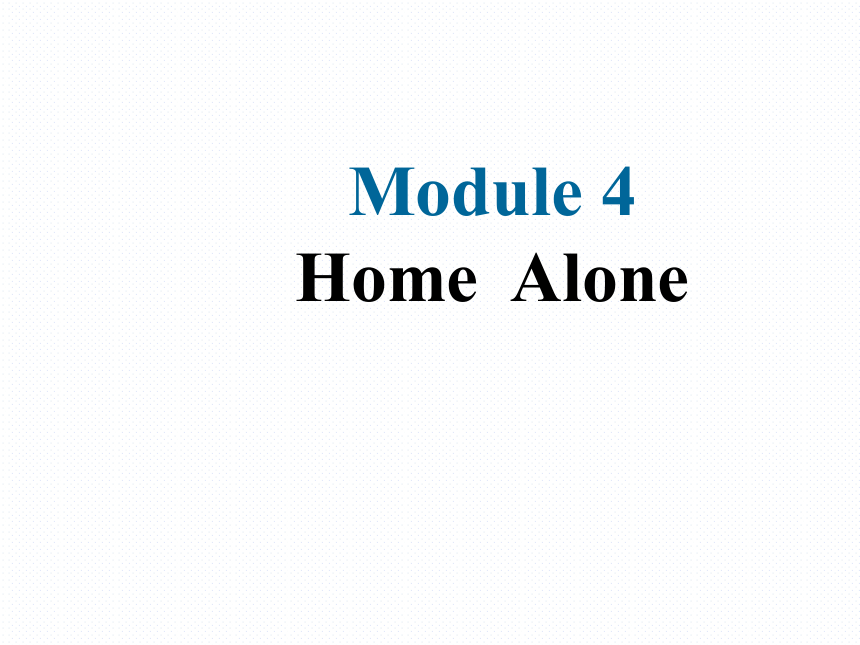 | |
| 格式 | ppt | ||
| 文件大小 | 1.3MB | ||
| 资源类型 | 教案 | ||
| 版本资源 | 外研版 | ||
| 科目 | 英语 | ||
| 更新时间 | 2018-08-05 08:44:35 | ||
图片预览

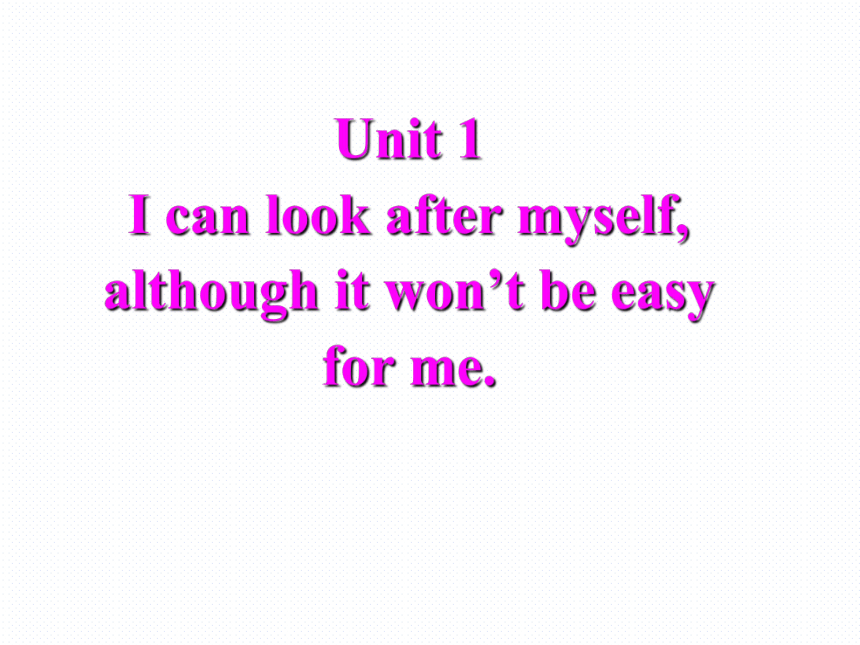
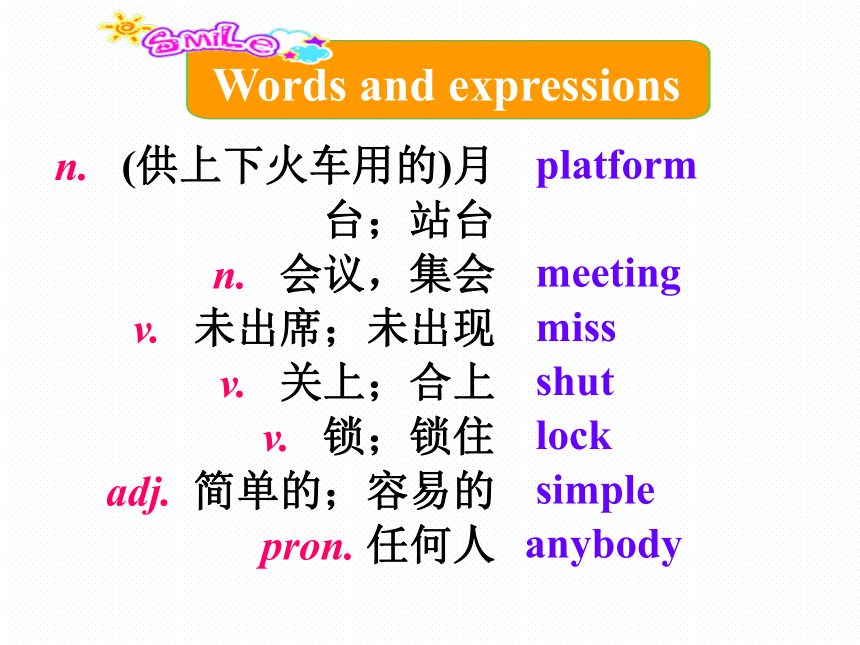
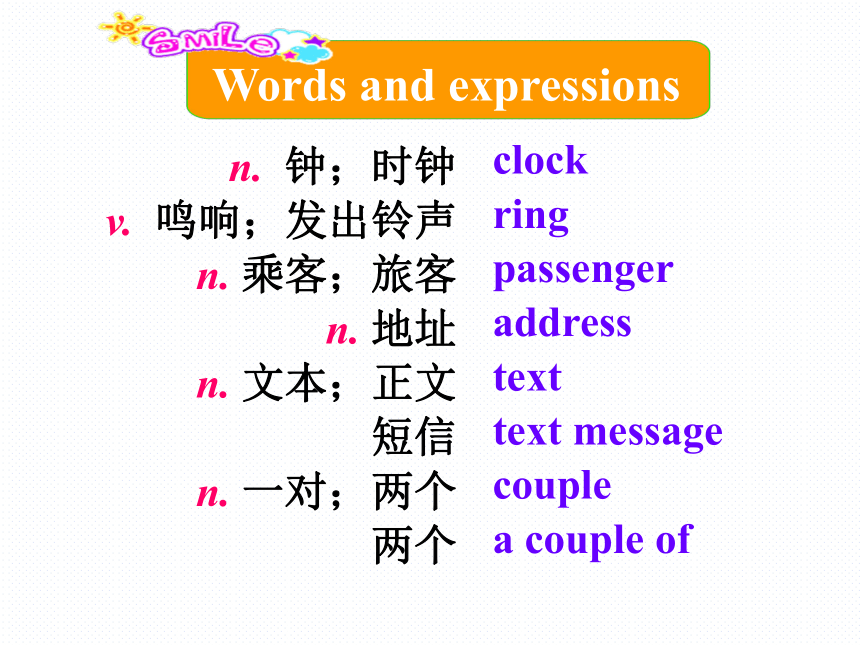
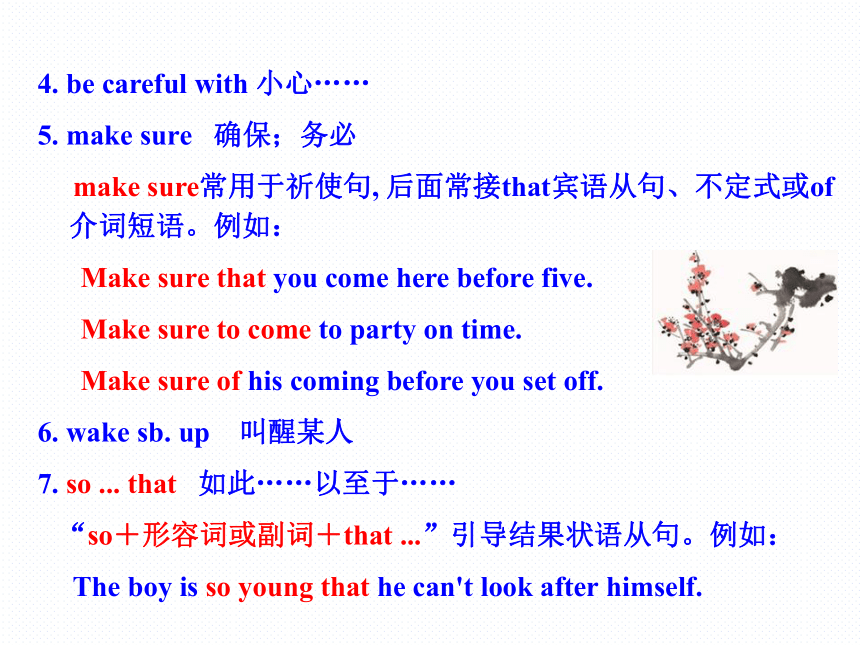


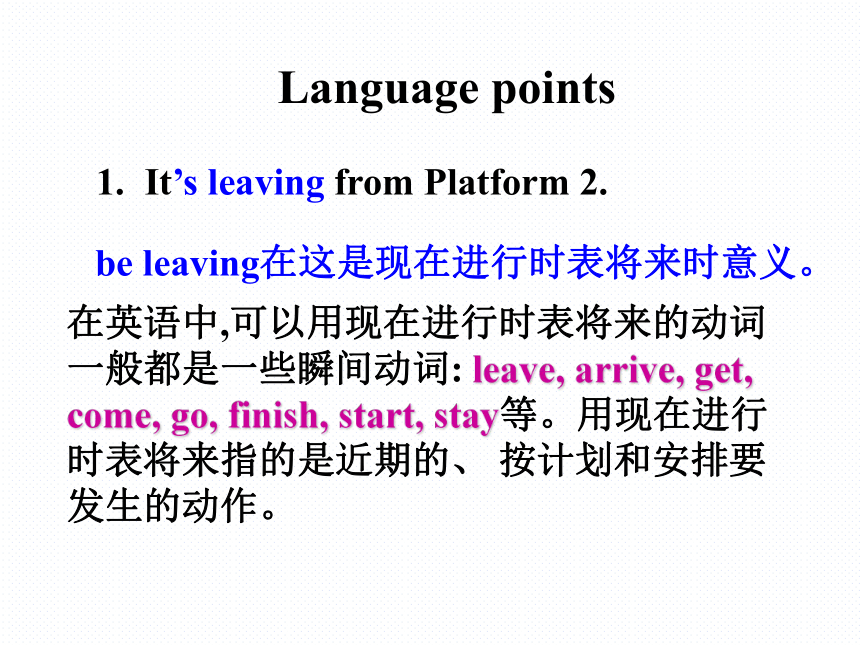

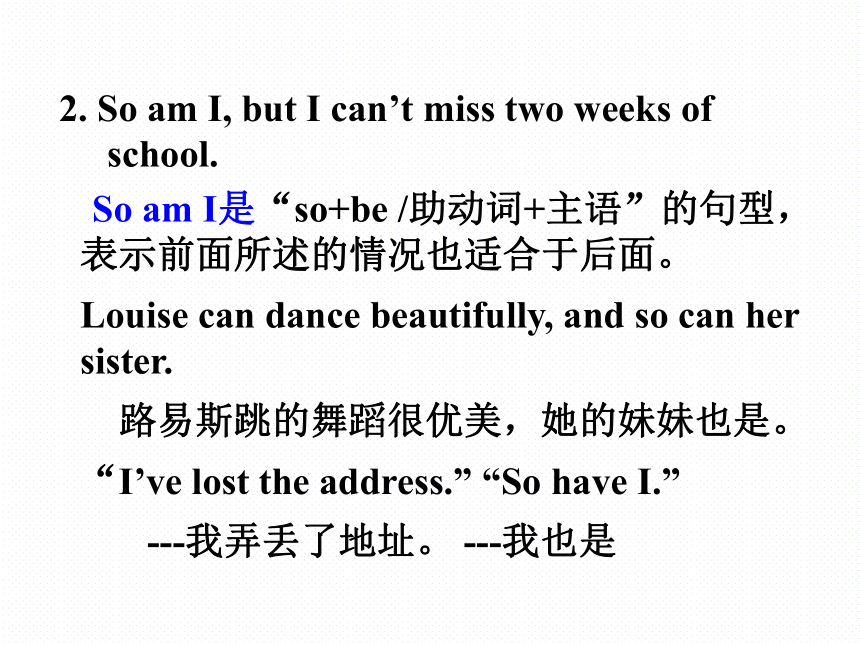
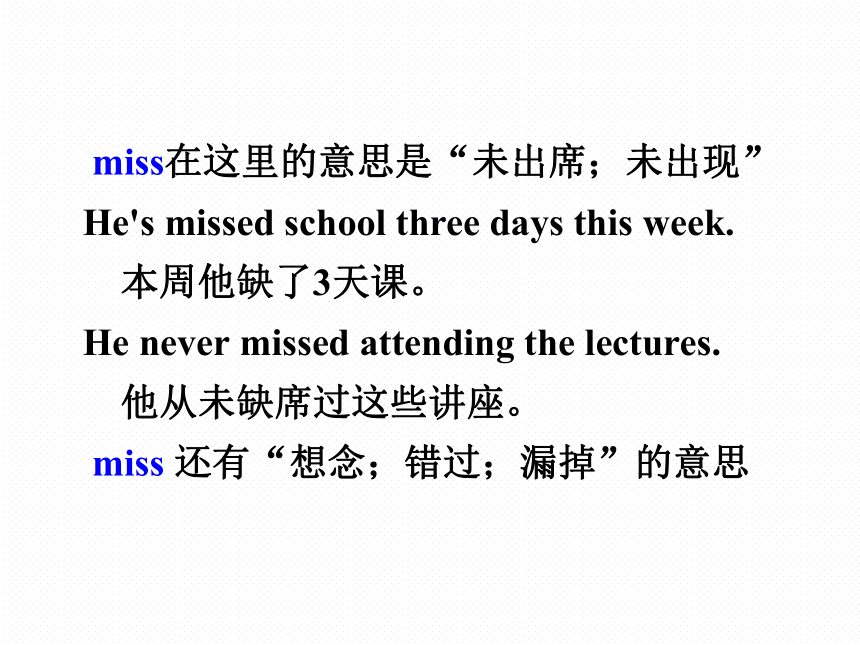
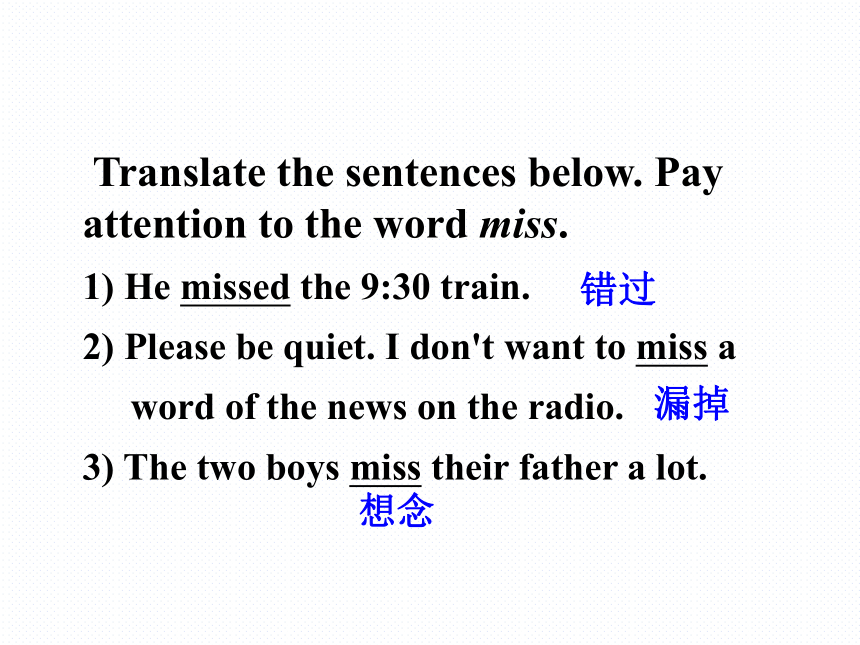
文档简介
(共83张PPT)
Module 4 Home Alone
Unit 1
I can look after myself, although it won’t be easy for me.
Words and expressions
platform
meeting
miss
shut
lock
simple
anybody
n. (供上下火车用的)月
台;站台
n. 会议,集会
v. 未出席;未出现
v. 关上;合上
v. 锁;锁住
adj. 简单的;容易的
pron. 任何人
Words and expressions
clock
ring
passenger
address
text
text message
couple
a couple of
n. 钟;时钟
v. 鸣响;发出铃声
n. 乘客;旅客
n. 地址
n. 文本;正文
短信
n. 一对;两个
两个
4. be careful with 小心……
5. make sure 确保;务必
make sure常用于祈使句, 后面常接that宾语从句、不定式或of介词短语。例如:
Make sure that you come here before five.
Make sure to come to party on time.
Make sure of his coming before you set off.
6. wake sb. up 叫醒某人
7. so ... that 如此……以至于……
“so+形容词或副词+that ...”引导结果状语从句。例如:
The boy is so young that he can't look after himself.
8. I'm sure ... 我确信……
be sure+of/about+动名词或名词,“对……有把握”
be sure to do sth. “肯定会做某事”
be sure+宾语从句;“确信……”
9. advise ... to do 建议……做……
10. be about to do 将要做……
表示即将发生的动作,在时间上指最近的将来,含有be about to do的句子中,不能再加时间状语。例如:
We are about to start. 我们就要出发了。
11. text message 短信
12. Have a good trip! 一路顺风;旅途愉快!
13. in a couple of weeks 几周后 (用于一般将来时)
● Now, ...
● I’m sorry …
● So am I.
● Have a good trip!
be leaving在这是现在进行时表将来时意义。
在英语中,可以用现在进行时表将来的动词一般都是一些瞬间动词: leave, arrive, get, come, go, finish, start, stay等。用现在进行时表将来指的是近期的、 按计划和安排要发生的动作。
It’s leaving from Platform 2.
Language points
They are getting married next month.
They are staying in Beijing for a week.
Annie is coming for supper this evening.
So am I是“so+be /助动词+主语”的句型,表示前面所述的情况也适合于后面。
Louise can dance beautifully, and so can her sister.
路易斯跳的舞蹈很优美,她的妹妹也是。
“I’ve lost the address.” “So have I.”
---我弄丢了地址。 ---我也是
2. So am I, but I can’t miss two weeks of school.
miss在这里的意思是“未出席;未出现”
He's missed school three days this week.
本周他缺了3天课。
He never missed attending the lectures.
他从未缺席过这些讲座。
miss 还有“想念;错过;漏掉”的意思
Translate the sentences below. Pay attention to the word miss.
1) He missed the 9:30 train.
2) Please be quiet. I don't want to miss a
word of the news on the radio.
3) The two boys miss their father a lot.
错过
漏掉
想念
Go along the street. The museum is just on your right. You can’t ________ it.
A. make B. find C. miss D. fail
解析:miss 在此句中的意思是“错过”。本句的意思是“沿着街道走下去,博物馆就在你的右边, 你不会错过它的”。
C
simple adj. 简单的;容易的
He wrote a story in simple English.
他用简单的英语写了一则故事。
I cooked myself a simple breakfast.
我给自己做了一顿简单的早饭。
比较级和最高级形式为:simpler, simplest
simply adv. 简单地;仅仅
3. I can cook simple meals.
simple, easy都可以表示“做某事或理解某事没有太大困难”。其区别是:
simple是个最一般的词, 指不复杂或不难懂, 因此能很快被头脑接受;
easy也是一个最一般的词, 常指事情容易做, 不费劲。
The plan sounds simple.
这个计划听起来相当简单。
It is very easy to do this thing.
做这件事非常容易。
知识链接
-- What was Jim wearing at the party
-- Nothing _____. He was in his usual shirt and jeans.
A. special B. simple
C. important D. interesting
A
anybody pron. 任何人
I didn't find anybody there.
我在那里没见到什么人。
You can ask anybody and you'll get the same answer.
你问谁答案都是一样的。
4. There won’t be anybody to wake you up …
anybody多用在疑问句、否定句和条件句中,意为“某人;任何人”; 也可用于肯定句中, 意思是“随便哪个人”。anybody不指物。
anybody, everybody的区别是:
anybody往往指“任何人”, 着重于个体; 而everybody则指“每个人”, 着重于“整体”。
知识链接
—Who helped Betty tidy up the bedroom just now
— _______. She cleaned it all by herself.
A. Somebody B. Nobody
C. Everybody D. Anybody
【解析】somebody“某人;有人”, nobody “没有人”, everybody “每个人”, anybody “任何一人”。句意:“谁帮助贝蒂收拾卧室了?”“没有人,她全靠自己打扫的。”。
B
wake up 醒来;叫(某人)醒来
He didn't wake up until 11 o'clock in the morning.
他上午十一点才醒。
Why did you wake me up from such a beautiful dream
你为什么把我从如此美妙的梦中唤醒?
She wants to _______ her job and go to study
in Australia.
A. grow up B. wake up
C. pick up D. give up
解析:根据后面study,当然只有放弃工作才能study。A是长大成人,B醒来,C是捡起或捎带。
D
so loudly that 是“so + 形容词/副词 + that + 从句”的结构。so … that 意思是“如此…以至于…”
This story is so interesting that I want to read it again.
这个故事如此有趣,我想再读一次。
He spoke so quickly that I couldn't follow him.
他说得如此快以至我跟不上他。
4. My clock rings so loudly that it will certainly wake me up.
ring v. 鸣响;发出铃声
Start to work when the bell rings.
铃响就开始工作。
My ears are still ringing.
我仍然耳鸣。
ring v. 打电话
n. 戒指;环;铃声;电话
Ask her to ring me up if you see her.
如果你见到她, 请让她给我打电话。
He has a gold ring on his finger.
他手指上戴着一枚金戒指。
There was a ring at the door.
门铃响了。
知识链接
---Can you tell me the English meaning of the word
---Why don't you _______ in the dictionary
A. look it up B. ring it up C. pick it up
—Wish you a pleasant journey!
—Thanks! I'll give you a _______ as soon as I arrive in Paris.
A. ring B. hand C. ride D. present
A
A
5. Your train is about to leave.
be about to do sth. 的意思是“就要/
正要……”.
e.g. We were just about to leave
when Jerry arrived.
杰里来的时候, 我们正准备走。
She looked as if she was about to
cry. 她看上去好像要哭了。
由于be about to do sth.本身已含有“即将”这样的时间概念,所以它习惯上不再与 soon, at once, immediately, tomorrow 这样的具体时间状语连用。
注 意
我们将马上讨论这个问题。(be about to)
We are about to discuss this problem.
6. See you in a couple of weeks!
couple 作名词, 意为“一对; 两个”。它
常用于固定短语a couple of, 表示“两
个”。
e.g. She has a couple of friends at
school.
她在学校有两个朋友。
couple n. 一对;两个;夫妇
The young couple fell in love at first sight.
这对年轻人一见钟情。
The couple celebrated their golden wedding in January.
这对夫妇一月份举行了他们的金婚大庆。
Three foreign couples live on the third floor.
有三对外国夫妇住在三楼。
couple, pair均有“一对,一双”之意。
couple多指在一起或彼此有关系的两个人或两个同样的事物。
pair含义广泛,可指人或物。用于物时,指两个互属的事物,缺此或失彼都会失去使用价值,或指由相对称的两部分构成的一件东西。
I found a couple of socks in the room but they do not make a pair.
我在房间找到两只袜子, 但不是一双的。
知识链接
1. 两周前我们在北京见过面。
We met in Beijing __ _______ ____
weeks ago.
2. 我妈妈每天早晨六点钟把我叫醒。
My mother _____ me ____ at six every
morning.
根据汉语意思完成英语句子, 每空一词。
a couple of
wake up
3. 昨天谁给他发了一条短信?
Who sent him a ____ ________ yesterday
4. 你出去时要特别当心那条狗。
Please ___ _________ ________ _____ that dog when you go out.
text message
be especially careful with
1. — We have an exam every month.
— __________.
A. So we have. B. So have we. C. So do we. D. So we do.
2. — I will have a meeting in Beijing next week. I'm going there by train .
—___________
A. Good luck. B. Have a good trip.
C. Enjoy yourself. D. Congratulations.
3. Here comes the bus. We're about _________.
A. to leave B. leaving C. leave D. to leaving
Ⅱ. 单项选择
C
B
A
I became so bored with their orders that I wished they would leave me alone.
Unit 2
Words and expressions
actually
manage
unhappy
turn off
order
be worried about
business
on business
sofa
adv. 事实上
v. 管理;支配
adj. 不高兴的
关掉;关闭(设备)
n. 命令;指示
担心
n. 工作
出差
n. (长)沙发
Words and expressions
snack
midnight
wake up
hand in
empty
unable
all day long
burn
cup
task
n. 点心;小吃
n. 午夜;子夜
醒;醒来
提交;上交
adj. 空的
adj. 不能做某事的
整天
v. (使)烧焦;(使)烤糊
n. 杯子;一杯饮料
n. 任务;工作
1. (be) a bit unhappy with 对……有一点不满意
2. turn off 关闭
3. (be) bored with 对……厌烦
3. come true 实现
4. be worried about 担心
5. on business 出差
6. have fun 玩得开心
7. as soon as 一……就
Language points
8. wake up 醒来
9. hurry to 匆匆忙忙去……
10. ask sb. for 向某人寻求某物 ;向某人索要某物
11. hand in 交上; 递交; 呈送
12. With an empty stomach, I was starving ...
with an empty stomach在句中作伴随状语。例如:
The young man went home with a happy heart.
13. be unable / able to 不能/能够做……
后面接动词原形。例如:Lucy was unable to find out what
had happened.
14. all day long 一整天
15. I found myself so bad at simple cooking task.
find + 宾语 + 宾语补足语(形容词、名词、代词、不定式、
v.-ing、过去分词、副词、介词短语)
I found Tony very honest.
I found it a boring film.
When he woke up, he found himself in the hospital.
We found the children to be very happy.
When I got off the bus, I found my parents waiting there.
The old man found his hometown much changed.
1. As a boy, like all other boys, I wanted to be a man.
作为男孩, 就像其他所有男孩一样, 我想做个男子汉。
man在此处意为“男子汉”。
e.g. Don’t cry anymore. Be a man!
2. Actually, they managed every minute
of my life.
实际上, 他们安排了我生活中的每一
分钟。
manage意为 “安排, 管理”。
e.g. Parents should not manage
everything for their children.
3. Turn off the TV!
关掉电视。
turn off 意为“关掉; 关闭(设备)”, 主要指关灯、电视、电脑、自来水、煤气等。
turn off 可与名词和代词连用: 与名词连用时, 名词可放在turn off 之后, 也可放在turn 和off 之间; 与代词连用时, 代词只能放在turn和off 之间。
如:
Jenny turned the computer off / turned off the computer.
The TV is too noisy. Can you turn it off
【链接】与turn off 相关的短语有turn on(打开), turn up(把……调高), turn down(把……调低)。如:
Can you help me turn on the TV
Please turn down your radio.
4. I became so bored with their orders that I wished they would leave me alone.
order 可以作名词表示“命令;指示”,此时是可数名词。如:
They received orders to start at once.
We should obey the orders of the
teacher.
order 还常用作动词, 表示“命令; 订购; 点(酒菜等)”。如:
The police ordered them to wait right there.
I have ordered two copies of that book.
He ordered a cup of coffee
5. I liked the games so much that I played until midnight.
我太喜欢玩游戏了,以至于一直玩到午夜.
(1)“so+形容词或副词+that”引导的结果
状语从句意思是“如此……以致于……”。 如:
When the basketball fans saw Jeremy Lin, they got so excited that they cried out.
当球迷们看到林书豪时,他们太激动,喊了起来。
The camera is so expensive that I can’t
afford it.
这架相机太贵了,我买不起。
他非常聪明,很快就算出了这道数学题。 (2012江苏扬州)
___________________________________
___________________________
He was so clever that he worked out that math problem quickly.
6. …, but I couldn’t hand it in.
……, 但是我交不了(作业)。
hand in指把物品“上交”,反义短语是hand out,把物品“分发”出去 。
We can help the teacher hand out the exam papers.
我们可以帮老师分发试卷。
I want you both to hand in your exercise-book today.
我要你们俩今天把练习本交上来。
7. Although my parents were very worried about leaving me, they had to go away on business for a few days.
be worried about 相当于worry about, 意为“为……发愁; 为……担心”。
e.g. June is worried about her English
test.
on business 意为 “出差”。
e.g. Jack will go to Shanghai on business.
6. The next morning I woke up late.
wake up 意为“叫醒……”。
当wake up的宾语是名词时, 宾语可放在wake和up的中间或up的后面; 当wake up的宾语是代词时, 宾语只能放在wake和up的中间。
e.g. Don’t wake up the baby.
= Don’t wake the baby up.
Let’s wake him up now.
7. The teacher asked me for my homework, but I could not hand it in.
hand in 意为“提交; 上交”。
e.g. Please hand in your paper
before Friday.
8. I was unable to play basketball with my classmates!
be unable to do sth. 不能做某事
be able to do sth. 能够做某事
e.g. He was unable to finish
homework on time.
他不能按时完成家庭作业。
9. I felt tired and sleepy at school all day long.
all day long 意为 “整天”。
强调由早到晚的过程。
e.g. She sang the song all day long.
10. With an empty stomach, I was starving ...
with an empty stomach在句中作伴随状语。例如:
The young man went home with a happy heart.
11. I found myself so bad at simple cooking task.
find + 宾语 + 宾语补足语(形容词、名词、代词、不定式、
v.-ing、过去分词、副词、介词短语)
I found Tony very honest.
I found it a boring film.
We found the children to be very happy.
When I got off the bus, I found my parents waiting there.
The old man found his hometown much changed.
(使)食物烧焦
晒黑
烫伤
消耗(脂肪)
(灯)开着,发亮
燃烧; 烧着
burn
1. (使)食物烧焦
I’d probably watch television and then
burn the soup.
我也许会在看电视时把汤给烧焦了。
2. 燃烧; 烧着
A fire was burning in the hearth, our
house was warm.
壁炉里面烧着火, 我们的房子是温暖的。
3. (灯)开着; 发亮
Sara left all the lights burning.
萨拉让所有的灯都开着。
4. 消耗(脂肪)
To change your body shape you need to burn calories.
要改变你的体形,你需要消耗热量。
5. 烫伤
The sand was so hot it burnt my feet.
沙子非常热,烫伤了我的脚。
6. 晒黑
Wear a hat so you don’t burn your neck.
戴上帽子,这样你不会把脖子晒黑。
根据句意及所给汉语提示写出句中所缺单词。
1. He didn’t go to bed until ________
(午夜).
2. The man gave _______ ( 命令)
that they should finish the work in
two days.
midnight
orders
3. They have ________ ( 烤糊) the potatoes and we can’t eat them.
4. As a student, my first _____ ( 任务) is to work hard.
5. They often eat some _______ ( 点心) in the afternoon.
snacks
burnt
task
1. We have to catch the __________ train.
2. I didn’t want to say anything without _________ reading the letter first.
midnight
actually
从方框内选择合适的词填空。
snack manage midnight order actually
3. He gave _______ for the work to be started.
4. Don’t tell me how to _______ my pocket money.
5. I only have time for a _______ at lunch time.
manage
orders
snack manage midnight order actually
snack
根据句意完成句子。
1. He ______ ______ to find himself alone in the house.
他醒来时发现屋里只有他一个人。
2. I _______ the watch ______ to the police.
我把那块表交给了警察。
3. I tried to contact (联系) him, but _______ _______ _______.
我试着和他联系,却没联系上。
woke up
handed in
was unable to
根据所给提示将下列汉语句子翻译成英语。
1. 下班后她忘记关掉电脑了。(turn off)
She forgot to turn off the computer
after work.
2. 我们明天将去上海出差。(on business)
We will go to Shanghai on business
tomorrow.
3. 你离开之前应该把房子收拾一下。(tidy up)
You should tidy up the house before you leave.
4. 我认为你的梦想不能实现。(come true)
I don’t think your dream can come true.
5. 别管他。咱们一起玩吧。(leave ... alone)
Leave him alone. Let’s play together.
6. 她今天为什么没有上交她的作业? (hand in)
Why didn’t she hand in her
homework today
7. 他家的每个人都担心他的未来。(be worried about)
Everyone in his family is worried about his future.
Unit 3
Language in use
状语从句
本单元涉及到的状语从句类型:
结果状语
从句
让步状语
从句
so… that…
although /though
结果状语从句
so…that…结构的意思是“太……以至于……”。so后面接形容词或副词,表示程度,that后接从句表示这一程度造成的影响或结果。
We were so noisy that our next-door neighbour came to complain.
我们太吵了,以致隔壁邻居前来抱怨。
I was so careless that I forgot something important.
我真是粗心,以致忘记了重要的事情。
He speaks so fast that I can’t understand him.
他说话太快了,以致我没理解他的意思。
such…that…也可以引导结果状语从句。与so…that…不同的是:such后面接名词或名词词组,结构为:
such+ (a/an)+形容词+名词+that…。
It’s such an interesting film that we all want to see it.
这部电影很有趣,我们都想去看。
It is such nice weather that I’d like to take a walk.
天气如此好,因此我想去散散步。
让步状语从句
由although引导的让步状语从句表示“尽管……,(但是)……”。一般情况下,可以和though引导的让步状语从句互换使用,但在口语中though更为常用。
I can look after myself, although/ though it won’t be easy for me.
我还是可以照顾自己的,虽然这对我来说并不容易。
Although/ Though Kevin is alone, he is very happy at first.
尽管凯文独自一人(在家),但他刚开始还是挺高兴的。
He went on fighting, though/ although he was wounded.
尽管受了伤,他还是继续战斗。
注意:汉语中“虽然/尽管”与“但是”往往同
时使用,但在英语中although/
though和but是不能同时使用的。
我不经常做饭,但是我会做。
I don’t often make dinner, but I can cook.
Although I don’t often make dinner, I can cook.
例如:
根据语境及所给汉语提示填空, 每空一词。
1. Mum ____ always ________ ______ (为……担心) me when I’m not at home.
2. You can ________ _____( 依靠) him to make a right choice.
is worried about
depend on
3. Peter is old enough and he can ________ ________ (照顾) himself.
4. My parents _____ _____ ________ ______ ____ (正忙着为……作准备) the dinner in the kitchen.
5. The boy is rude and he always ________ ______ (与……打架) other boys.
look after
are busy getting
ready for
fights with
6. He made the mistakes ___ ________ (偶然).
7. Don’t be ____ ___ ______(匆忙地) to say something about it. First find out the truth.
in a hurry
by accident
根据所给提示将下列汉语句子翻译成英语。
1. 你的裙子虽然很旧, 但看上去很干
净。(although)
Although your skirt is very old, it
looks very clean.
2. 我爷爷年龄太大, 以至于走不快。
(so ... that ...)
My grandfather is so old that he
can’t walk fast.
3. 虽然工作很难, 但是他们没有放弃。(but)
The work is very difficult, but they
didn’t give up.
4. 因为她太懒了, 所以没有人喜欢她。(because)
Nobody likes her because she is too lazy.
5. 他买了一条船以便他能去钓鱼。(so that)
He bought a boat so that he could go
fishing.
单项选择。
1. The box is _______ heavy ______ we can’t carry it.
A. so; that B. such; that C. too; to
2. —Look! Some people are running the red lights.
—We should wait _____ others are breaking the rule.
A. if B. unless
C. although D. because
3. —Susan, what are the advantages of MP5 players
—Mom, they are smaller and lighter ______ they can be carried very easily.
A. unless B. if
C. until D. so that
4. My Chinese teacher is very knowledgeable ______ she reads lots of books.
A. but B. so
C. because D. although
填入适当的引导词。
1. It was _____ dark ______ they couldn’t see each other’s faces.
2. He will not go to the cinema _______ he is very busy.
3. ________ the two girls are twins, they don’t look the same.
4. He is explaining clearly _______ they could understand.
so that
because
Although
so that
Module 4 Home Alone
Unit 1
I can look after myself, although it won’t be easy for me.
Words and expressions
platform
meeting
miss
shut
lock
simple
anybody
n. (供上下火车用的)月
台;站台
n. 会议,集会
v. 未出席;未出现
v. 关上;合上
v. 锁;锁住
adj. 简单的;容易的
pron. 任何人
Words and expressions
clock
ring
passenger
address
text
text message
couple
a couple of
n. 钟;时钟
v. 鸣响;发出铃声
n. 乘客;旅客
n. 地址
n. 文本;正文
短信
n. 一对;两个
两个
4. be careful with 小心……
5. make sure 确保;务必
make sure常用于祈使句, 后面常接that宾语从句、不定式或of介词短语。例如:
Make sure that you come here before five.
Make sure to come to party on time.
Make sure of his coming before you set off.
6. wake sb. up 叫醒某人
7. so ... that 如此……以至于……
“so+形容词或副词+that ...”引导结果状语从句。例如:
The boy is so young that he can't look after himself.
8. I'm sure ... 我确信……
be sure+of/about+动名词或名词,“对……有把握”
be sure to do sth. “肯定会做某事”
be sure+宾语从句;“确信……”
9. advise ... to do 建议……做……
10. be about to do 将要做……
表示即将发生的动作,在时间上指最近的将来,含有be about to do的句子中,不能再加时间状语。例如:
We are about to start. 我们就要出发了。
11. text message 短信
12. Have a good trip! 一路顺风;旅途愉快!
13. in a couple of weeks 几周后 (用于一般将来时)
● Now, ...
● I’m sorry …
● So am I.
● Have a good trip!
be leaving在这是现在进行时表将来时意义。
在英语中,可以用现在进行时表将来的动词一般都是一些瞬间动词: leave, arrive, get, come, go, finish, start, stay等。用现在进行时表将来指的是近期的、 按计划和安排要发生的动作。
It’s leaving from Platform 2.
Language points
They are getting married next month.
They are staying in Beijing for a week.
Annie is coming for supper this evening.
So am I是“so+be /助动词+主语”的句型,表示前面所述的情况也适合于后面。
Louise can dance beautifully, and so can her sister.
路易斯跳的舞蹈很优美,她的妹妹也是。
“I’ve lost the address.” “So have I.”
---我弄丢了地址。 ---我也是
2. So am I, but I can’t miss two weeks of school.
miss在这里的意思是“未出席;未出现”
He's missed school three days this week.
本周他缺了3天课。
He never missed attending the lectures.
他从未缺席过这些讲座。
miss 还有“想念;错过;漏掉”的意思
Translate the sentences below. Pay attention to the word miss.
1) He missed the 9:30 train.
2) Please be quiet. I don't want to miss a
word of the news on the radio.
3) The two boys miss their father a lot.
错过
漏掉
想念
Go along the street. The museum is just on your right. You can’t ________ it.
A. make B. find C. miss D. fail
解析:miss 在此句中的意思是“错过”。本句的意思是“沿着街道走下去,博物馆就在你的右边, 你不会错过它的”。
C
simple adj. 简单的;容易的
He wrote a story in simple English.
他用简单的英语写了一则故事。
I cooked myself a simple breakfast.
我给自己做了一顿简单的早饭。
比较级和最高级形式为:simpler, simplest
simply adv. 简单地;仅仅
3. I can cook simple meals.
simple, easy都可以表示“做某事或理解某事没有太大困难”。其区别是:
simple是个最一般的词, 指不复杂或不难懂, 因此能很快被头脑接受;
easy也是一个最一般的词, 常指事情容易做, 不费劲。
The plan sounds simple.
这个计划听起来相当简单。
It is very easy to do this thing.
做这件事非常容易。
知识链接
-- What was Jim wearing at the party
-- Nothing _____. He was in his usual shirt and jeans.
A. special B. simple
C. important D. interesting
A
anybody pron. 任何人
I didn't find anybody there.
我在那里没见到什么人。
You can ask anybody and you'll get the same answer.
你问谁答案都是一样的。
4. There won’t be anybody to wake you up …
anybody多用在疑问句、否定句和条件句中,意为“某人;任何人”; 也可用于肯定句中, 意思是“随便哪个人”。anybody不指物。
anybody, everybody的区别是:
anybody往往指“任何人”, 着重于个体; 而everybody则指“每个人”, 着重于“整体”。
知识链接
—Who helped Betty tidy up the bedroom just now
— _______. She cleaned it all by herself.
A. Somebody B. Nobody
C. Everybody D. Anybody
【解析】somebody“某人;有人”, nobody “没有人”, everybody “每个人”, anybody “任何一人”。句意:“谁帮助贝蒂收拾卧室了?”“没有人,她全靠自己打扫的。”。
B
wake up 醒来;叫(某人)醒来
He didn't wake up until 11 o'clock in the morning.
他上午十一点才醒。
Why did you wake me up from such a beautiful dream
你为什么把我从如此美妙的梦中唤醒?
She wants to _______ her job and go to study
in Australia.
A. grow up B. wake up
C. pick up D. give up
解析:根据后面study,当然只有放弃工作才能study。A是长大成人,B醒来,C是捡起或捎带。
D
so loudly that 是“so + 形容词/副词 + that + 从句”的结构。so … that 意思是“如此…以至于…”
This story is so interesting that I want to read it again.
这个故事如此有趣,我想再读一次。
He spoke so quickly that I couldn't follow him.
他说得如此快以至我跟不上他。
4. My clock rings so loudly that it will certainly wake me up.
ring v. 鸣响;发出铃声
Start to work when the bell rings.
铃响就开始工作。
My ears are still ringing.
我仍然耳鸣。
ring v. 打电话
n. 戒指;环;铃声;电话
Ask her to ring me up if you see her.
如果你见到她, 请让她给我打电话。
He has a gold ring on his finger.
他手指上戴着一枚金戒指。
There was a ring at the door.
门铃响了。
知识链接
---Can you tell me the English meaning of the word
---Why don't you _______ in the dictionary
A. look it up B. ring it up C. pick it up
—Wish you a pleasant journey!
—Thanks! I'll give you a _______ as soon as I arrive in Paris.
A. ring B. hand C. ride D. present
A
A
5. Your train is about to leave.
be about to do sth. 的意思是“就要/
正要……”.
e.g. We were just about to leave
when Jerry arrived.
杰里来的时候, 我们正准备走。
She looked as if she was about to
cry. 她看上去好像要哭了。
由于be about to do sth.本身已含有“即将”这样的时间概念,所以它习惯上不再与 soon, at once, immediately, tomorrow 这样的具体时间状语连用。
注 意
我们将马上讨论这个问题。(be about to)
We are about to discuss this problem.
6. See you in a couple of weeks!
couple 作名词, 意为“一对; 两个”。它
常用于固定短语a couple of, 表示“两
个”。
e.g. She has a couple of friends at
school.
她在学校有两个朋友。
couple n. 一对;两个;夫妇
The young couple fell in love at first sight.
这对年轻人一见钟情。
The couple celebrated their golden wedding in January.
这对夫妇一月份举行了他们的金婚大庆。
Three foreign couples live on the third floor.
有三对外国夫妇住在三楼。
couple, pair均有“一对,一双”之意。
couple多指在一起或彼此有关系的两个人或两个同样的事物。
pair含义广泛,可指人或物。用于物时,指两个互属的事物,缺此或失彼都会失去使用价值,或指由相对称的两部分构成的一件东西。
I found a couple of socks in the room but they do not make a pair.
我在房间找到两只袜子, 但不是一双的。
知识链接
1. 两周前我们在北京见过面。
We met in Beijing __ _______ ____
weeks ago.
2. 我妈妈每天早晨六点钟把我叫醒。
My mother _____ me ____ at six every
morning.
根据汉语意思完成英语句子, 每空一词。
a couple of
wake up
3. 昨天谁给他发了一条短信?
Who sent him a ____ ________ yesterday
4. 你出去时要特别当心那条狗。
Please ___ _________ ________ _____ that dog when you go out.
text message
be especially careful with
1. — We have an exam every month.
— __________.
A. So we have. B. So have we. C. So do we. D. So we do.
2. — I will have a meeting in Beijing next week. I'm going there by train .
—___________
A. Good luck. B. Have a good trip.
C. Enjoy yourself. D. Congratulations.
3. Here comes the bus. We're about _________.
A. to leave B. leaving C. leave D. to leaving
Ⅱ. 单项选择
C
B
A
I became so bored with their orders that I wished they would leave me alone.
Unit 2
Words and expressions
actually
manage
unhappy
turn off
order
be worried about
business
on business
sofa
adv. 事实上
v. 管理;支配
adj. 不高兴的
关掉;关闭(设备)
n. 命令;指示
担心
n. 工作
出差
n. (长)沙发
Words and expressions
snack
midnight
wake up
hand in
empty
unable
all day long
burn
cup
task
n. 点心;小吃
n. 午夜;子夜
醒;醒来
提交;上交
adj. 空的
adj. 不能做某事的
整天
v. (使)烧焦;(使)烤糊
n. 杯子;一杯饮料
n. 任务;工作
1. (be) a bit unhappy with 对……有一点不满意
2. turn off 关闭
3. (be) bored with 对……厌烦
3. come true 实现
4. be worried about 担心
5. on business 出差
6. have fun 玩得开心
7. as soon as 一……就
Language points
8. wake up 醒来
9. hurry to 匆匆忙忙去……
10. ask sb. for 向某人寻求某物 ;向某人索要某物
11. hand in 交上; 递交; 呈送
12. With an empty stomach, I was starving ...
with an empty stomach在句中作伴随状语。例如:
The young man went home with a happy heart.
13. be unable / able to 不能/能够做……
后面接动词原形。例如:Lucy was unable to find out what
had happened.
14. all day long 一整天
15. I found myself so bad at simple cooking task.
find + 宾语 + 宾语补足语(形容词、名词、代词、不定式、
v.-ing、过去分词、副词、介词短语)
I found Tony very honest.
I found it a boring film.
When he woke up, he found himself in the hospital.
We found the children to be very happy.
When I got off the bus, I found my parents waiting there.
The old man found his hometown much changed.
1. As a boy, like all other boys, I wanted to be a man.
作为男孩, 就像其他所有男孩一样, 我想做个男子汉。
man在此处意为“男子汉”。
e.g. Don’t cry anymore. Be a man!
2. Actually, they managed every minute
of my life.
实际上, 他们安排了我生活中的每一
分钟。
manage意为 “安排, 管理”。
e.g. Parents should not manage
everything for their children.
3. Turn off the TV!
关掉电视。
turn off 意为“关掉; 关闭(设备)”, 主要指关灯、电视、电脑、自来水、煤气等。
turn off 可与名词和代词连用: 与名词连用时, 名词可放在turn off 之后, 也可放在turn 和off 之间; 与代词连用时, 代词只能放在turn和off 之间。
如:
Jenny turned the computer off / turned off the computer.
The TV is too noisy. Can you turn it off
【链接】与turn off 相关的短语有turn on(打开), turn up(把……调高), turn down(把……调低)。如:
Can you help me turn on the TV
Please turn down your radio.
4. I became so bored with their orders that I wished they would leave me alone.
order 可以作名词表示“命令;指示”,此时是可数名词。如:
They received orders to start at once.
We should obey the orders of the
teacher.
order 还常用作动词, 表示“命令; 订购; 点(酒菜等)”。如:
The police ordered them to wait right there.
I have ordered two copies of that book.
He ordered a cup of coffee
5. I liked the games so much that I played until midnight.
我太喜欢玩游戏了,以至于一直玩到午夜.
(1)“so+形容词或副词+that”引导的结果
状语从句意思是“如此……以致于……”。 如:
When the basketball fans saw Jeremy Lin, they got so excited that they cried out.
当球迷们看到林书豪时,他们太激动,喊了起来。
The camera is so expensive that I can’t
afford it.
这架相机太贵了,我买不起。
他非常聪明,很快就算出了这道数学题。 (2012江苏扬州)
___________________________________
___________________________
He was so clever that he worked out that math problem quickly.
6. …, but I couldn’t hand it in.
……, 但是我交不了(作业)。
hand in指把物品“上交”,反义短语是hand out,把物品“分发”出去 。
We can help the teacher hand out the exam papers.
我们可以帮老师分发试卷。
I want you both to hand in your exercise-book today.
我要你们俩今天把练习本交上来。
7. Although my parents were very worried about leaving me, they had to go away on business for a few days.
be worried about 相当于worry about, 意为“为……发愁; 为……担心”。
e.g. June is worried about her English
test.
on business 意为 “出差”。
e.g. Jack will go to Shanghai on business.
6. The next morning I woke up late.
wake up 意为“叫醒……”。
当wake up的宾语是名词时, 宾语可放在wake和up的中间或up的后面; 当wake up的宾语是代词时, 宾语只能放在wake和up的中间。
e.g. Don’t wake up the baby.
= Don’t wake the baby up.
Let’s wake him up now.
7. The teacher asked me for my homework, but I could not hand it in.
hand in 意为“提交; 上交”。
e.g. Please hand in your paper
before Friday.
8. I was unable to play basketball with my classmates!
be unable to do sth. 不能做某事
be able to do sth. 能够做某事
e.g. He was unable to finish
homework on time.
他不能按时完成家庭作业。
9. I felt tired and sleepy at school all day long.
all day long 意为 “整天”。
强调由早到晚的过程。
e.g. She sang the song all day long.
10. With an empty stomach, I was starving ...
with an empty stomach在句中作伴随状语。例如:
The young man went home with a happy heart.
11. I found myself so bad at simple cooking task.
find + 宾语 + 宾语补足语(形容词、名词、代词、不定式、
v.-ing、过去分词、副词、介词短语)
I found Tony very honest.
I found it a boring film.
We found the children to be very happy.
When I got off the bus, I found my parents waiting there.
The old man found his hometown much changed.
(使)食物烧焦
晒黑
烫伤
消耗(脂肪)
(灯)开着,发亮
燃烧; 烧着
burn
1. (使)食物烧焦
I’d probably watch television and then
burn the soup.
我也许会在看电视时把汤给烧焦了。
2. 燃烧; 烧着
A fire was burning in the hearth, our
house was warm.
壁炉里面烧着火, 我们的房子是温暖的。
3. (灯)开着; 发亮
Sara left all the lights burning.
萨拉让所有的灯都开着。
4. 消耗(脂肪)
To change your body shape you need to burn calories.
要改变你的体形,你需要消耗热量。
5. 烫伤
The sand was so hot it burnt my feet.
沙子非常热,烫伤了我的脚。
6. 晒黑
Wear a hat so you don’t burn your neck.
戴上帽子,这样你不会把脖子晒黑。
根据句意及所给汉语提示写出句中所缺单词。
1. He didn’t go to bed until ________
(午夜).
2. The man gave _______ ( 命令)
that they should finish the work in
two days.
midnight
orders
3. They have ________ ( 烤糊) the potatoes and we can’t eat them.
4. As a student, my first _____ ( 任务) is to work hard.
5. They often eat some _______ ( 点心) in the afternoon.
snacks
burnt
task
1. We have to catch the __________ train.
2. I didn’t want to say anything without _________ reading the letter first.
midnight
actually
从方框内选择合适的词填空。
snack manage midnight order actually
3. He gave _______ for the work to be started.
4. Don’t tell me how to _______ my pocket money.
5. I only have time for a _______ at lunch time.
manage
orders
snack manage midnight order actually
snack
根据句意完成句子。
1. He ______ ______ to find himself alone in the house.
他醒来时发现屋里只有他一个人。
2. I _______ the watch ______ to the police.
我把那块表交给了警察。
3. I tried to contact (联系) him, but _______ _______ _______.
我试着和他联系,却没联系上。
woke up
handed in
was unable to
根据所给提示将下列汉语句子翻译成英语。
1. 下班后她忘记关掉电脑了。(turn off)
She forgot to turn off the computer
after work.
2. 我们明天将去上海出差。(on business)
We will go to Shanghai on business
tomorrow.
3. 你离开之前应该把房子收拾一下。(tidy up)
You should tidy up the house before you leave.
4. 我认为你的梦想不能实现。(come true)
I don’t think your dream can come true.
5. 别管他。咱们一起玩吧。(leave ... alone)
Leave him alone. Let’s play together.
6. 她今天为什么没有上交她的作业? (hand in)
Why didn’t she hand in her
homework today
7. 他家的每个人都担心他的未来。(be worried about)
Everyone in his family is worried about his future.
Unit 3
Language in use
状语从句
本单元涉及到的状语从句类型:
结果状语
从句
让步状语
从句
so… that…
although /though
结果状语从句
so…that…结构的意思是“太……以至于……”。so后面接形容词或副词,表示程度,that后接从句表示这一程度造成的影响或结果。
We were so noisy that our next-door neighbour came to complain.
我们太吵了,以致隔壁邻居前来抱怨。
I was so careless that I forgot something important.
我真是粗心,以致忘记了重要的事情。
He speaks so fast that I can’t understand him.
他说话太快了,以致我没理解他的意思。
such…that…也可以引导结果状语从句。与so…that…不同的是:such后面接名词或名词词组,结构为:
such+ (a/an)+形容词+名词+that…。
It’s such an interesting film that we all want to see it.
这部电影很有趣,我们都想去看。
It is such nice weather that I’d like to take a walk.
天气如此好,因此我想去散散步。
让步状语从句
由although引导的让步状语从句表示“尽管……,(但是)……”。一般情况下,可以和though引导的让步状语从句互换使用,但在口语中though更为常用。
I can look after myself, although/ though it won’t be easy for me.
我还是可以照顾自己的,虽然这对我来说并不容易。
Although/ Though Kevin is alone, he is very happy at first.
尽管凯文独自一人(在家),但他刚开始还是挺高兴的。
He went on fighting, though/ although he was wounded.
尽管受了伤,他还是继续战斗。
注意:汉语中“虽然/尽管”与“但是”往往同
时使用,但在英语中although/
though和but是不能同时使用的。
我不经常做饭,但是我会做。
I don’t often make dinner, but I can cook.
Although I don’t often make dinner, I can cook.
例如:
根据语境及所给汉语提示填空, 每空一词。
1. Mum ____ always ________ ______ (为……担心) me when I’m not at home.
2. You can ________ _____( 依靠) him to make a right choice.
is worried about
depend on
3. Peter is old enough and he can ________ ________ (照顾) himself.
4. My parents _____ _____ ________ ______ ____ (正忙着为……作准备) the dinner in the kitchen.
5. The boy is rude and he always ________ ______ (与……打架) other boys.
look after
are busy getting
ready for
fights with
6. He made the mistakes ___ ________ (偶然).
7. Don’t be ____ ___ ______(匆忙地) to say something about it. First find out the truth.
in a hurry
by accident
根据所给提示将下列汉语句子翻译成英语。
1. 你的裙子虽然很旧, 但看上去很干
净。(although)
Although your skirt is very old, it
looks very clean.
2. 我爷爷年龄太大, 以至于走不快。
(so ... that ...)
My grandfather is so old that he
can’t walk fast.
3. 虽然工作很难, 但是他们没有放弃。(but)
The work is very difficult, but they
didn’t give up.
4. 因为她太懒了, 所以没有人喜欢她。(because)
Nobody likes her because she is too lazy.
5. 他买了一条船以便他能去钓鱼。(so that)
He bought a boat so that he could go
fishing.
单项选择。
1. The box is _______ heavy ______ we can’t carry it.
A. so; that B. such; that C. too; to
2. —Look! Some people are running the red lights.
—We should wait _____ others are breaking the rule.
A. if B. unless
C. although D. because
3. —Susan, what are the advantages of MP5 players
—Mom, they are smaller and lighter ______ they can be carried very easily.
A. unless B. if
C. until D. so that
4. My Chinese teacher is very knowledgeable ______ she reads lots of books.
A. but B. so
C. because D. although
填入适当的引导词。
1. It was _____ dark ______ they couldn’t see each other’s faces.
2. He will not go to the cinema _______ he is very busy.
3. ________ the two girls are twins, they don’t look the same.
4. He is explaining clearly _______ they could understand.
so that
because
Although
so that
同课章节目录
- Module 1 Wonders of the world
- Unit 1 It's more than 2,000 years old.
- Unit 2 The Grand Canyon was not just big.
- Unit 3 Language in use
- Module 2 Public holidays
- Unit 1 My family always go somewhere interesting a
- Unit 2 We have celebrated the festival since the f
- Unit 3 Language in use
- Module 3 Heroes
- Unit 1 She trained hard,so she became a great play
- Unit 2There were few doctors, so he had to work ve
- Unit 3 Language in use
- Module 4 Home alone
- Unit 1 I can look after myself, although it won’t
- Unit 2 I became so bored with their orders that I
- Unit 3 Language in use
- Module 5 Museums
- Unit 1 Don't cross that rope!
- Unit 2 If you ever go to London, make sure you vis
- Unit 3 Language in use
- Module 6 Problems
- Unit 1 If I start after dinner, I'll finish it be
- Unit 2 If you tell him the truth now, you will sho
- Unit 3 Language in use
- Revision Module A
- Module 7 Great books
- Unit 1 We're still influenced by Confucius's idea
- Unit 2 It is still read and loved.
- Unit 3 Language in use
- Module 8 Sports life
- Unit 1 Daming wasn't chosen for the team last time
- Unit 2 He was invited to competitions around the w
- Unit 3 Language in use
- Module 9 Great inventions
- Unit 1 Will computers be used more than books in t
- Unit 2 Will books be replaced by the Internet?
- Unit 3 Language in use
- Module 10 Australia
- Unit 1 I have some photos that I took in Australia
- Unit 2 The game that they like most is Australian
- Unit 3 Language in use
- Module 11 Photos
- Unit 1 He's the boy who won the photo competition
- Unit 2 The photo which we liked best was taken by
- Unit 3 Language in use
- Module 12 Save our world
- Unit 1 If everyone starts to do something, the wor
- Unit 2 Repeat these three words daily: reduce, reu
- Unit 3 Language in use
- Revision Module B
